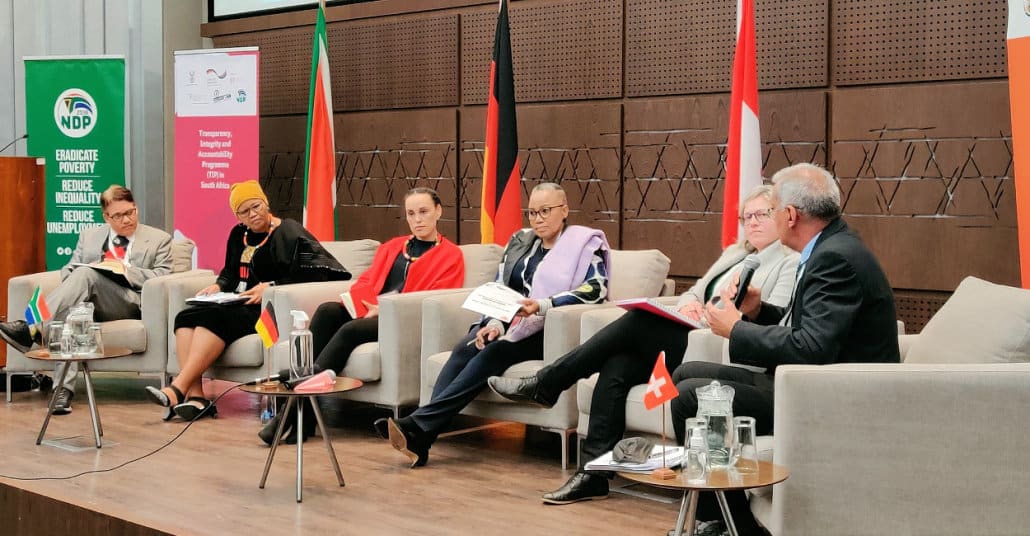South Africa’s Department of Planning, Monitoring and Evaluation (DPME), together with the German and Swiss governments, has embarked on a new tripartite programme, the South African–German–Swiss Cooperation on the Transparency, Integrity and Accountability programme (TIP) in South Africa.
With the focus on open public procurement, TIP is designed with a multi-sectoral approach involving all relevant actors to develop new ways of preventing corruption in the country. The programme is underpinned by the National Anti-Corruption Strategy, specifically Pillar 4:
- Improve the integrity and credibility of the public procurement system to ensure fair, effective and efficient use of public resources.
TIP was officially launched on 20 June in Pretoria. Its implementation in South Africa will be driven by international development agency Deutsche Gesellschaft für Internationale Zusammenarbeit (GIZ).
Speakers included Henk Serfontein, chief director: public service monitoring in the Department of Planning, Monitoring and Evaluation, Swiss ambassador Nicolas Brühl, and German ambassador Andreas Peschke. The trio represented their respective governments at the event, and were at pains to stress that such a partnership is not new, as the three governments already co-operate in fields such as renewable energies as well as career development for employment success.
“Public procurement systems can be beneficial for all stakeholders, including the government, private businesses, civil society, academia and citizens at large, but this only happens when it is fair, transparent and well-functioning,” said Brühl at the event. “The programme we are launching will also bring together key stakeholders to join their efforts for integrity in the sphere of public procurement.”
As co-chair of the TIP programme on the civil society side, Corruption Watch (CW) was represented on the discussion panel by our executive director Karam Singh. CW board member Gugu McLaren-Ushewokunze was also present, though in her capacity as the National Business Institute’s (NBI) head of social transformation. The NBI is a member of the TIP steering committee.
Fellow panelists included representatives from the Office of the Chief Procurement Officer, the Special Investigating Unit, and the Public Affairs Research Institute.
Singh spoke on the requirements for a credible, transparent procurement system, particularly from a civil society point of view. McLaren-Ushewokunze, meanwhile, addressed the need for citizen participation in the fight against corruption, and citizens’ ability to access the right mechanisms to help them in that fight.
Active citizens required
Speaking to SAfm during the launch, Stanley Ntakumba, chief director at the DPME, said the two European countries will provide technical assistance, through development partner GIZ. The special focus is on prevention of corruption, to help ensure that leakage [of resources] stops, and law enforcement agencies do their part on consequence management.
“The issue of public procurement is important in fighting corruption, and one of the global good practices around it is the extent to which you become more transparent with regard to who got the contract, for how much, and are they doing the work they are supposed to be doing.”
The three focus areas of the programme, he added, encompass active citizenry, “in which the media plays a big role”, institution building in both the public and private sectors, and setting up multi-stakeholder partnerships according to best practice.
A whole-of-society approach is needed, with active citizenship as the starting point – therefore the programme will develop ways to mobilise the public, hear their voices, and build trust in institutions which is, according to Ntakumba, one of the weaknesses that government now acknowledges. “Communication, engagement, sharing of corruption information, and responsiveness are well-known approaches to build that trust.”
Ultimately, he added, the goal is to reduce poverty, fight inequality, grow the economy, and prevent leakage. “Lessons have been learned about our failure to prevent corruption, hence state capture”.
“Corruption Watch is quite active in this regard [open public procurement], as a part of Transparency International,” Ntakumba commented.
However, everyone has a role to play.
One of the key activities going forward is to map all the stakeholders that will be needed to contribute to TIP, Ntakumba said. “We must organise business, organise labour, media, traditional leadership and others. This is not just about government.”

